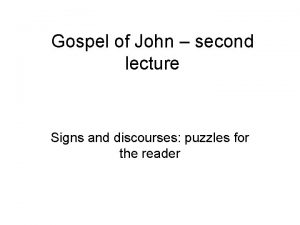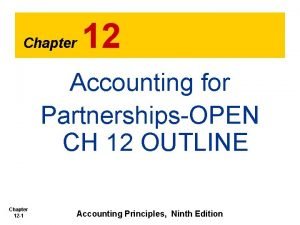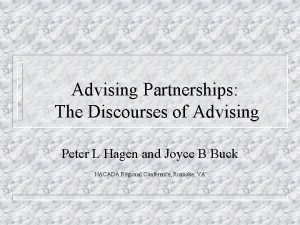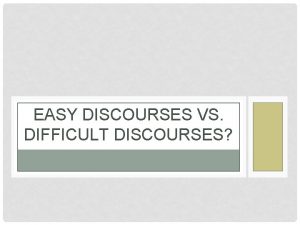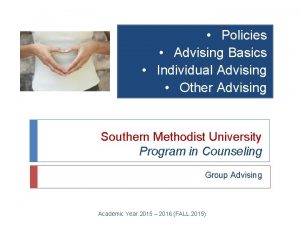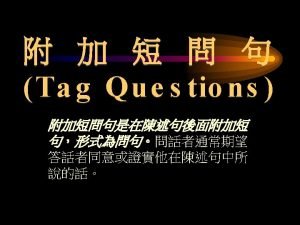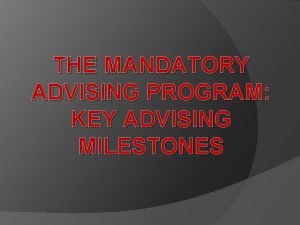Advising Partnerships The Discourses of Advising Peter L










- Slides: 10

Advising Partnerships: The Discourses of Advising Peter L Hagen and Joyce B Buck NACADA Regional Conference, Roanoke, VA

Introduction n n We have long felt that advising is and should be regarded primarily as a communication interaction. Advising should be dialogical or dialectical in the way it is conducted. A recent contributor to The Mentor agrees: Lowenstein has argued that advising should be a two- way street, with give and take on the part of both parties. It follows from this argument that the study of communication is important to advising and advisers. Our communication styles will affect how well we advise.

Academic Communication n Most advisers have at least one advanced degree. Graduate n students are expected to develop three aspects of intellectual identity: knowledgeability, originality, and intellectual sophistication. Discourse is used to display these aspects. Those who stay and complete their degrees have adopted these traits. Recent studies in communication describe the culture of graduate school as one of argument, where the dazzling reasoner, the skilled questioner, and the grandstanding arguer get all the strokes and the quiet listener gets the boot. The use of argument shows the character that the successful student has developed.

Bilateral Communication n n Bilateral communication allows each interlocutor allows the same access to argument. The bilateral communicator is as willing to be refuted as to refute. The bilateral communicator is open-minded, not authoritarian. The unilateral communicator is one-sided, authoritarian, closed-minded. Sometimes this authority is needed. I wouldn't want a bilateral communicator to guide people to the lifeboats on the Titanic.

bilateral continued n Ultimately, we think that Johnstone's notions of ideal communication have their grounding in Kant's categorical imperative: "I should never act except in such a way that I can also will that my maxim should become a universal law. " With Johnstone, and ultimately Kant, we hold that the Other before us is not someone to be controlled, but to be guided with reverence.

The Discourses of Advising n As graduate students, we trained to argue intellectually in order to win. In advising we need to establish a relationship. Can these contradictory aims coexist? n Advising discourse needs to start with students telling us their needs. They come to us vulnerable and unsophisticated. They come to us because they don't know something that they need to know. We can't be uncomfortable with our students' vulnerability and ignorance. We need to educate them, to engage them in transforming themselves.

discourse continued n n This discourse asks us to practice ethnography: to sublimate--to the extent possible--our selfhood, to come to know what it is like to be that other person. Know when to be a critic--and do so respectfully. It is ethically defensible to hold students up to their own scrutiny. To show the inconsistencies in their own behavior vis-à-vis their stated beliefs. "You believe education is important, but you've been working 45 hours each week and carrying a full-time load. Each semester you drop or fail one course. This is a pattern--see it for what it is.

discourse continued n n We should question our impulses to coerce our students into cooperating with us and to stereotype them. We should present our humanity, not just our authority. Show our own weaknesses, our mistakes.

Questions and Case Studies n n n Is bilateral communication always the preferred mode of communication? How do you behave when the student is not willing to engage in bilateral communication ? How do we engage reticient students?

Sources n n n Corbin, Susan, "Relationship maintenance in action: Catching up on the day's events at dinner, " Paper presented at the National Communication Association meeting, Chicago, IL, November 1997. Johnstone, Henry W. , Jr. , "Bilaterality in Argument and Communication, " Advances in Argumentation: Theory and Research, J. Robert Cox and Charles Arthur Willard, eds. Carbondale, IL: Southern Illinois University Press, 1982, pp. 95 -102. Kant, Immanuel, Grounding for the Metaphysics of Morals, [1785]. Lowenstein, Marc, "An Alternative to the Developmental Theory of Advising, " The Mentor, November 1999 [http: //www. psu. edu/dept/dus/mentor]. Tannen, Deborah, "Agonism in the Academy: Surviving Higher Learning's Argument Culture, " Chronicle of Higher Education, March 31, 2000, pp B 7 -8. Tracy, Karen and Julie Naughton, "The Identity Work of Questioning in Intellectual Discussion, " Communication Monographs, Volume 61, no. 4, pp 281 -302.
 7 discourses in john
7 discourses in john Matthew chap 5
Matthew chap 5 Discourse example sentence
Discourse example sentence New discourses
New discourses Marketing word partnerships
Marketing word partnerships Account www.publicpartnerships.com
Account www.publicpartnerships.com Product development partnerships
Product development partnerships Epsrc prosperity partnerships
Epsrc prosperity partnerships Accounting for partnerships chapter 12 solutions
Accounting for partnerships chapter 12 solutions Jit scheduling tactics
Jit scheduling tactics Chapter 12 accounting for partnerships answers
Chapter 12 accounting for partnerships answers
